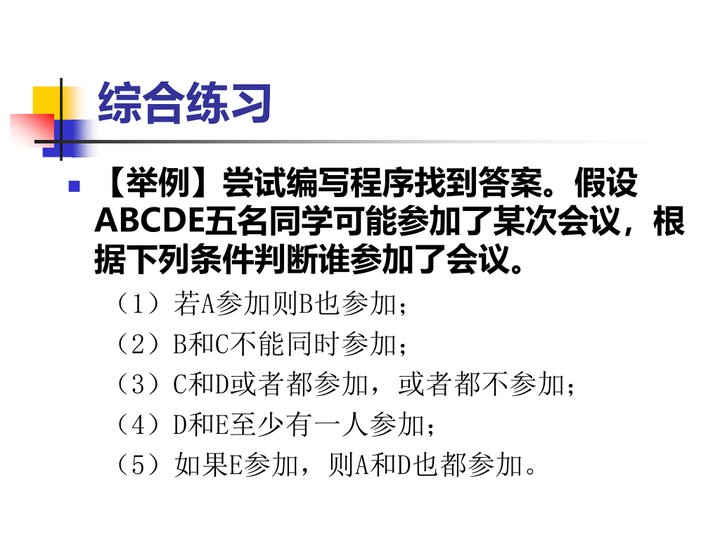Problem Description This problem is from Zhihu https://www.zhihu.com/question/596919226
Write a program to find a reasonable answer.
Assume there is a meeting and there are 5 possible studunts as attendees - A, B, C, D, and E. Distinguish who will attend the meeting according to the below conditions:
If A attends, B will also attend.
B and C can’t attend at the same time.Either C and D will both attend, or they both won’t attend.
At least one person from D and E will attend.
If E attends, then A and D will also attend.
Solutions bitset 1 2 3 4 5 6 7 8 9 10 11 12 13 14 15 16 17 18 19 20 21 22 23 24 25 26 27 28 29 30 31 32 33 34 35 36 37 38 39 40 41 42 #include <bitset> #include <iostream> bool check (const std::bitset<5 >& student) if (student[0 ]) {if (!student[1 ]) {return false ;if (student[1 ] && student[2 ]) {return false ;if (student[2 ] != student[3 ]) {return false ;if (!student[3 ] && !student[4 ]) {return false ;if (student[4 ]) {if (!student[0 ] || !student[3 ]) {return false ;return true ;int main () constexpr int n = 5 ;for (int i = 0 ; i < 1 << n; ++i) {std::bitset<n> s (i) ;if (check (s)) {to_string () << std::endl;return 0 ;
The result 01100 means that two person - C and D - will attend.
Condition Conjunction 1 2 3 4 5 6 7 8 9 10 11 12 13 14 15 16 17 18 19 bool check (const std::bitset<5 >& student) auto cond1 = [&]() {return !student[0 ] || student[1 ];auto cond2 = [&]() {return !student[1 ] || !student[2 ];auto cond3 = [&]() {return student[2 ] == student[3 ];auto cond4 = [&]() {return student[3 ] || student[4 ];auto cond5 = [&]() {return !student[4 ] || (student[0 ] && student[3 ]);return cond1 () && cond2 () && cond3 () && cond4 () && cond5 ();
1 2 3 4 5 6 7 8 9 10 11 12 13 14 15 16 17 18 19 20 21 22 23 24 25 26 27 28 29 30 31 32 33 34 35 36 37 38 39 40 41 42 43 44 45 46 47 48 49 50 51 52 53 54 55 56 57 58 59 60 61 62 63 64 65 66 67 68 69 70 71 72 73 74 75 76 77 78 79 80 81 82 83 84 85 #include <bitset> #include <functional> #include <iostream> #include <vector> template <size_t Size>class Solver {public :using ConditionCallback = std::function<bool (const std::bitset<Size>&)>;void register_condition (ConditionCallback condition) push_back (std::move (condition));false ;void solve () if (m_is_clean) {return ;clear_result ();auto check = [this ]() {for (const ConditionCallback& condition : m_conditions) {if (!condition (m_bitset)) {return false ;return true ;for (int i = 0 ; i < (1 << Size); ++i) {if (check ()) {push_back (m_bitset.to_string ());true ;void print () for (const std::string& result : m_results) {private :void clear_result () 0 ;clear ();bool m_is_clean{true };int main () 5 > solver;register_condition ([](const auto & student) {return !student[0 ] || student[1 ];register_condition ([](const auto & student) {return !student[1 ] || !student[2 ];register_condition ([](const auto & student) {return student[2 ] == student[3 ];register_condition ([](const auto & student) {return student[3 ] || student[4 ];register_condition ([](const auto & student) {return !student[4 ] || (student[0 ] && student[3 ]);solve ();print ();return 0 ;
